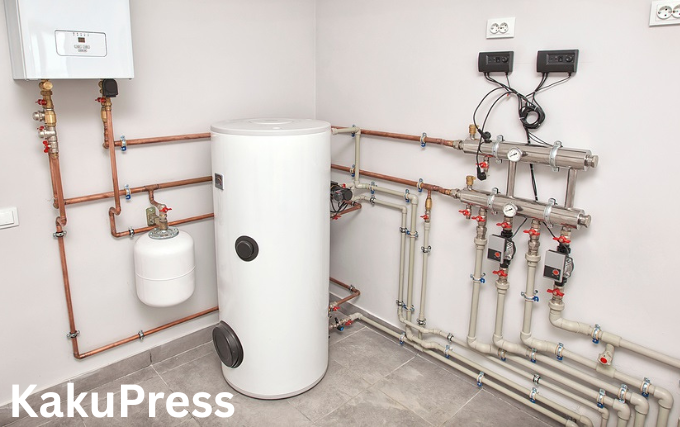Boilers are super important for keeping our homes cosy, but they need regular check-ups to work well and stay safe. Little issues like leaks, pressure problems, or a dodgy pilot light can mess up your comfort and lead to pricey fixes.
Identifying and addressing these issues early on can help you avoid costly repairs and maintain a safe environment. This guide gives you simple steps to tackle common boiler problems. With these tips, you can keep your boiler humming nicely, making sure you stay warm and worry-free during the chilly months.
Check the Power Supply
Before getting into complicated fixes, let’s start simple: make sure your boiler’s got power. This easy step can often sort things out quickly and cheaply. Here are some basic checks to try.
Ensure Proper Connection
First, check the boiler’s plugged in properly. Sounds obvious, but it’s easy to miss. Look at the circuit breaker for any tripped switches messing with the power. If you spot any, reset them and see if the boiler’s back in action.
Inspect and Replace
Then, take a look at the fuses connected to the boiler. If any are blown, swap them out. Also, check the power cord for any damage like frays or cuts, as these can mess up power flow and the boiler’s performance.
Verify Thermostat Settings
Make sure the thermostat’s set right. If it seems off, maybe change the batteries or peek at the manual for help. If the problem persists, bringing in a professional could be the smartest next step.
Why This Matters
Doing these power checks can fix small problems fast, saving you time and cash. It’s important to have a good power supply before tackling bigger issues, avoiding unnecessary repairs and keeping your heating running smoothly.
Inspect the Pressure Gauge
Keeping an eye on your boiler’s pressure gauge is super important to make sure it runs smoothly and you don’t end up with pricey fixes. You want the gauge to read between 14.5 and 21.75 psi. Sticking to this range helps your boiler last longer and work better.
The Risks of Over-Pressurizing
If the pressure goes up too high, it can cause leaks or serious damage. After adding water to your boiler, check the gauge carefully.
If the pressure is too high, releasing air by bleeding the radiators might help balance the system. Just use a radiator key to crack open the valve a bit and let out any trapped air, which will help lower the pressure.
Consult the Manual
Since boilers can be different, it’s a good idea to check your boiler’s manual for tips on keeping the right pressure. Staying within the suggested range not only makes your boiler run better but also helps it last longer. If you’re unsure or having trouble, calling in a pro is a smart move.
Doing regular checks and small tweaks can stop big repairs from being needed and keep your boiler in great shape. This not only saves you cash but also gives you peace of mind knowing your boiler’s in good condition.
Examine the Pilot Light
The pilot light is a small but mighty part of your boiler, crucial for keeping your home warm and cozy. So, first things first, let’s see if it’s lit.
You’re looking for a small, steady blue flame. No flame? Don’t worry. Grab your manufacturer’s guide to safely get it going again. You’ll usually need to turn off the gas, wait a bit, and then press the ignition button.
Keep an eye out for any drafts or blockages that might blow out the flame. Common culprits are open windows or vents nearby.
And don’t forget to check the thermocouple—it’s a nifty safety device that senses whether the flame is on. A dirty or faulty component can cause the pilot light to repeatedly shut off.
Still having trouble? It could be the right moment to bring in an expert. It’s safer and can save you from bigger headaches down the road.
Keeping an eye on that little flame is a simple way to keep your boiler running smoothly. Why not take a moment to check your pilot light today? It’s a quick task that can make a big difference!
Look for Leaks
Boilers can leak sometimes, and if you ignore it, it might cost you a lot. So, have a good look at your boiler and the area around it for any water leaks. Check out the pipes, seals, and joints because they can get worn out.
Spot a small leak? Clean it up right away to stop it from getting worse. But if it’s a big one, turn off the boiler and the water supply to stop more trouble. Big leaks could mean there’s a bigger issue that needs an expert to fix.
Acting fast not only keeps your place safe but also helps your boiler work better. If you think there’s a major problem, calling a professional can save you from bigger damage and repair bills later on.
Listen for Unusual Noises
If your boiler’s making weird noises, like banging or clanging, it’s probably a sign something’s up. Sometimes, it’s just air trapped inside messing things up. Try bleeding your radiators with a radiator key to let the air out, but do it gently to avoid spills.
Still hearing odd sounds? It might be sediment build-up, which can cause overheating. A system flush could help clear it out and get things running smoothly again.
But if the noises stick around after all that, it’s a good idea to call in a pro. Those sounds might mean there’s a bigger problem that needs fixing. Sorting it out quickly can keep your boiler running well and save you from expensive repairs later on.
Clean the Boiler Components
Keeping your boiler tidy is really important to make sure it works well. Dust and bits can build up, making it less efficient or even causing it to overheat. Start by checking out the filters and vents since they get dirty easily.
Giving the area around the boiler a quick vacuum can help stop any clogs. Always have a look at your boiler’s manual for cleaning tips that fit your model. On top of your own cleaning, think about getting a professional clean once a year.
This not only makes it work better but also helps it last longer. Regular cleaning helps avoid surprise breakdowns, keeping your heating running smoothly all year.
Call a Professional
If your boiler’s acting up and nothing you do helps, it might be a good idea to call in the pros. They know how to handle gas stuff safely. Experts catch problems we might miss and can handle tricky repairs.
Getting your boiler checked out regularly by someone who knows their stuff can keep it from breaking down later. Jumping on issues early might save you from big, expensive fixes.
A well-looked-after boiler not only runs better but also keeps you safe and might even cut down those energy bills. Plus, you’ll feel more relaxed knowing everything’s under control!
Conclusion
If you deal with boiler problems quickly and keep up with regular maintenance, it’ll run smoothly and save you from expensive repairs. Just doing simple things like checking the power, watching pressure levels, and keeping everything clean really helps.
If you hear weird noises or notice ongoing issues, it’s probably time to call a pro. Acting fast keeps things safe and makes your boiler last longer.
Following these tips means you’ll have a safer and cheaper way to heat your home. So, make maintenance a priority for a worry-free and efficient heating system all year round.







